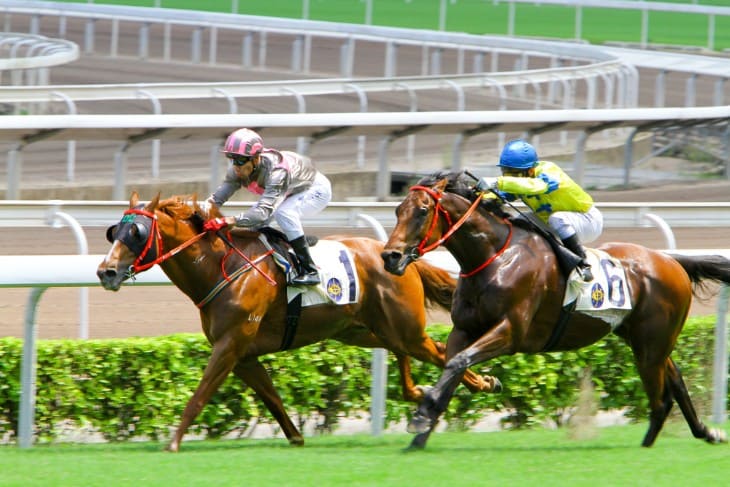Welcome to the world of jockeys, where strength, skill, and finesse merge on the back of a galloping steed. But have you ever wondered what fuels these equestrian athletes? In this article, we'll delve into the critical role of nutrition in the life of a jockey, exploring the dietary strategies that drive their top-notch performances.
Jockeys are a unique breed of athletes, often overshadowed by the majestic horses they ride. While the bond between rider and horse is undeniable, the physical and mental demands on a jockey are often underestimated. It's not just about guiding the horse; it's about timing, precision, and a deep connection that requires physical prowess and mental agility.
However, when discussing jockey performance, the spotlight usually falls on training routines and horsemanship skills. Nutrition, however, is an equally vital factor, often working behind the scenes to elevate a jockey's capabilities. From maintaining an optimal weight to fuelling for race day, a jockey's diet is a complex equation that demands close attention.
The Science of Riding
Behind every victorious ride lies a symphony of physiological demands. The exertion required to control a half-ton horse at breakneck speeds, the intense focus to navigate through the field, and the strategic decisions that can make or break a race - all of these place a unique set of burdens on a jockey's body and mind.
To unravel the relationship between jockey performance and nutrition, it's essential to comprehend the science of riding. Riding isn't just a physical activity; it's a symbiotic dance between rider and horse. The biomechanics involved in maintaining balance and synchrony, coupled with the quick decision-making required, demand an athlete's finesse.
When it comes to nutrition, understanding the demands of jockeying is crucial. Imagine needing the strength to control a powerful creature while maintaining the agility to shift weight fluidly through various riding styles. This places immense demands on the musculoskeletal system and requires adequate energy, protein, and nutrient intake.
Weight Management and Performance
Picture this: A jockey elegantly guiding their mount around the track, the wind whipping past as they race towards the finish line. But behind this picturesque scene lies a challenge unique to jockeys - weight management. Unlike other athletes, jockeys must adhere to strict weight limits to ensure both their safety and the horse's comfort.
The interplay between weight and performance is a delicate balance. Jockeys need to be lightweight to enhance their horses' speed, yet they can't compromise on muscle mass and strength. It's a puzzle that requires a meticulous approach, often involving dietary strategies that can seem puzzling to the uninitiated.
Essential Nutrients for Jockeys
Just like a finely tuned racehorse needs the right diet for peak performance, a jockey's body demands precise nutritional support. From carbohydrates that fuel rapid bursts of energy to protein that repairs and builds muscles, the right mix of nutrients is essential for riding excellence.
Carbohydrates act as the jockey's fuel source, providing energy for races and training sessions. They're the body's preferred energy source, especially during high-intensity activities like racing. Complex carbohydrates, found in foods like whole grains and vegetables, release energy steadily, ensuring jockeys don't run out of steam mid-race.
Proteins, on the other hand, are the building blocks of muscle tissue. The demands of jockeying can lead to muscle breakdown, making protein intake crucial for repair and growth. Lean sources like poultry, fish, and legumes offer the necessary amino acids without excess fat, aiding in maintaining a strong and lean physique.
Let's not forget about vitamins and minerals - these micronutrients are the unsung heroes of a jockey's diet. Calcium and vitamin D are vital for strong bones, essential when considering the impacts of riding and potential falls. B vitamins play a role in energy metabolism, helping jockeys stay sharp and focused during long days at the track.
For further reading: Nutrition and Care for a Racehorse.
Crafting a Balanced Diet
Now that we've scratched the surface of jockey nutrition, it's time to roll up our sleeves and delve into the practical aspects of crafting a diet that fuels success. A balanced diet for a jockey isn't just about counting calories; it's about understanding the nuances of nutrient timing and making smart choices.
Start with the foundation: carbohydrates. Opt for whole grains like brown rice, quinoa, and whole wheat bread. These provide a sustained release of energy, preventing those energy crashes that can affect a jockey's performance. Pair carbs with lean proteins like chicken, turkey, or tofu, creating a synergy that aids in muscle repair and growth.
Vegetables and fruits should be the stars of every plate. These nutrient-packed foods provide essential vitamins, minerals, and antioxidants that support overall health and recovery. Think colourful salads, vitamin-rich stir-fries, and energy-boosting smoothies.
The Pre-Race Ritual
As race day approaches, a jockey's focus sharpens, and so does their attention to nutrition. The pre-race meal isn't just about satisfying hunger; it's about priming the body for optimal performance. Jockeys often opt for easily digestible foods that provide quick energy without causing discomfort.
Complex carbohydrates take the spotlight here, offering a quick burst of energy without the subsequent crash. A bowl of oatmeal, a banana, or a slice of whole grain toast with honey are popular choices. Including a small amount of protein helps prevent hunger during the race, while staying hydrated ensures that the body is primed for action.
However, the pre-race ritual isn't just about food. Jockeys must also consider timing - eating too close to the race can lead to discomfort, while eating too early might cause energy dips. It's a delicate balance that requires trial and error to find the sweet spot for each individual.
Hydration Matters
In the fast-paced world of horse racing, it's not just about what you eat; it's about what you drink. Hydration is a cornerstone of a jockey's performance, influencing everything from concentration to stamina. Riding can be deceptively sweaty work, and staying adequately hydrated is essential to prevent performance dips and potential health issues.
Jockeys need to balance fluid intake with the realities of weight management. While water is crucial, they also need to consider electrolytes lost through sweat. Electrolytes like sodium, potassium, and magnesium play a pivotal role in muscle contraction and nerve function. Sports drinks or electrolyte-infused water can help replenish these vital minerals and prevent dehydration during races and training sessions.
Snacking for Stamina
In the intense world of horse racing, jockeys don't always have the luxury of sitting down to full meals. This is where strategic snacking comes into play. Well-timed snacks can provide quick bursts of energy without the discomfort of a heavy stomach during races.
Think of snacks as mini-meals with a purpose. A handful of almonds or a yogurt cup with berries can provide a balance of protein, healthy fats, and carbohydrates to keep energy levels steady. Dried fruit and energy bars can be convenient options, but remember to read labels and avoid excess sugars.
The key is to strike a balance between satisfying hunger and fueling performance. Snacking shouldn't be an afterthought; it should be a planned and purposeful part of a jockey's nutritional strategy.

Recovery and Repair
The thundering hooves have quieted, the race is over, and the jockey dismounts. But the journey doesn't end at the finish line. Post-race recovery is as critical as the race itself. The body, pushed to its limits during the race, now needs repair and rejuvenation.
Recovery nutrition is all about refuelling and aiding muscle repair. After an intense race, jockeys should aim to consume a meal rich in carbohydrates and proteins within the first hour. This kickstarts the recovery process by replenishing glycogen stores and providing the amino acids necessary for muscle repair.
Don't forget about hydration, either. After sweating it out on the track, rehydrating with water or electrolyte drinks helps restore the body's fluid balance and supports metabolic functions. A well-hydrated body recovers more efficiently, setting the stage for the next ride.
Beyond the Diet - Lifestyle Factors
While a jockey's diet is undoubtedly a cornerstone of their performance, other lifestyle factors play a pivotal role in their success. Sleep, stress management, and overall well-being are intertwined with their dietary choices.
Adequate sleep is vital for muscle recovery, cognitive function, and overall mood. Jockeys' schedules can be demanding, but prioritising sleep can significantly impact their performance on and off the track. Stress, too, can take a toll. The high-pressure environment of racing can affect performance and well-being. Techniques like meditation, deep breathing, and yoga can be invaluable tools for managing stress.
Additionally, avoiding harmful habits like smoking and excessive alcohol consumption can contribute to a jockey's overall health and longevity in their career. It's about creating a holistic lifestyle that complements the dedication they put into their riding skills.
Conclusion
The world of jockeying is a symphony of skill, teamwork, and passion. But it's also a world where nutrition quietly takes the reins, driving performance to new heights. From the science of riding to the nuanced art of crafting a jockey's diet, we've explored the intricacies that fuel the triumphs on the track.
As you watch the next race, remember the unseen efforts behind the scenes - the meal plans, the hydration strategies, the recovery rituals. The jockey's journey to top performance is as much about what they put on their plates as it is about the harmony they find with their equine partners. So, here's to the jockeys, the unsung heroes of the racecourse, and the nutritional path they tread towards excellence.
For more information:
- The Role of Jockeys in Horse Racing
- UK Horse Racing: The Essential Gear for Jockeys
- A Look at UK's Most Successful Jockeys








